According to the USDA’s National Agricultural Statistics Service, over 126,500,000 acres were used to operate farms and ranches in Texas in 2019. With millions of head of livestock and tons of cotton and produce harvested in the state annually, we know big business when we see it.
At ATKG we are proud to partner with so many in the farm and ranch community and a few of us have firsthand knowledge of what it is like to work in these family businesses. We know you know your business best and our goal is to provide current and long term planning ideas to help give you peace of mind and while this industry is one of longest standing in our economy, recent events have given rise to new opportunities to make sure your business continues to thrive.
CARES Act – New Opportunities Created for Farms and Ranches
Refundable Payroll Tax Credit
The CARES Act created new credits for 2020 available to employers whose operations were fully or partially interrupted by COVID-19 related issued. The credits are also available if your business gross receipts declined by more than 50% compared to the same quarter of the prior operating year.
Deferred Payment for Employer Payroll Taxes
For businesses experiencing a liquidity crunch during the past few months, this program allows employers to defer the payment of the employer’s 6.2% of social security tax through the end of 2020. The deferred amount is required to be paid over a two-year period of time in 2021 and 2022. This is not a forgiveness of tax due, only a deferral of payment.
Qualified Improvement Property Amendment
This CARES Act amendment corrects and change from the 2017 TCJA that increased the depreciable life of qualified improvement property to 39 years and is retroactive to the beginning on 2018. Capital improvements that fall into this category can now be depreciated over 15 years, and maybe more importantly for some, now qualify for bonus depreciation.
Cost segregation studies for new property purchases or construction have always been an important planning tool, but now have become even more impactful to maximizing deductions for farms and ranches.
Net Operating Loss Carry-backs and Excess Business Losses
The ability to “carry back” most current year losses to a tax paying year was removed as part of the TCJA of 2017, however certain farming losses were still available for a two-year carry-back period. The CARES Act amendment will now not only allow all of the taxpayer’s losses to be carried back up but extended the carry-back period to to 5 years in order to receive tax refunds. In passing, the CARES Act also removed the 80% limitation for usage of net operating losses in the current tax year, further increasing potential refund amounts.
The CARES Act also delayed the implementation of excess business loss limitations that previously capped operating losses at $500,000 for couples and $250,000 for single taxpayers, trusts and estates. These losses are now fully deductible for 2018, 2019 and 2020, with the limitations coming into effect in 2021.This means that businesses experiencing net losses for many different reasons (COVID-19, start up years, taking advantage of the updated favorable depreciation changes) can not only fully utilize those losses in the year incurred, but can carry them back to tax paying years in order to receive a refund.
With so many new planning opportunities created by the CARES Act changes, it is important to discuss which apply to your unique business situation and the best plan for taking advantage of them.
Important Planning Reminders
Business Plans
Business plans are an important tool in running a successful business. As your operations change due to planned or unplanned circumstances, so should your business plan. Make sure to update forecasts for revenues and expenses, as well as document how your service lines may need to change to account for changes in supply and demand.
Succession and Estate Planning
Farms and ranches tend to be businesses that the whole family can be involved in. Make sure you are planning for the future by having discussions with team members about their current and future involvement. It is never too early to start planning for the passing of the torch to the next generation to ensure the family business thrives for years to come. The current environment of substantial lifetime gifting exemptions from the TCJA of 2017, coupled with depressed valuations stemming from COVID-19 uncertainty, holds ample opportunity for those looking to continue the family legacy.
Farm and ranch businesses are unique and definitely essential. At ATKG we know that we have the experience and the knowledge to support our farm and ranch clients and would love to help you plan for today’s challenges and tomorrow’s opportunities.
Hayley Cornelius Almaraz is a Senior Manager with ATKG and is a Certified Public Accountant. She graduated Summa Cum Laude as a dual major in accounting and finance and soon after received her Master of Accountancy from The University of Texas at San Antonio. Hayley can be reached at 210.733.6611 or via email at hcornelius@atkgcpa.com.
